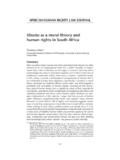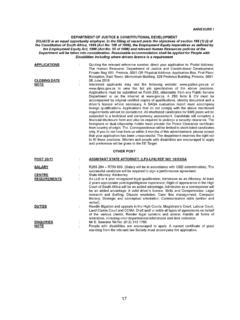Transcription of THE SUPREME COURT OF APPEAL OF SOUTH …
1 THE SUPREME COURT OF APPEAL OF SOUTH africa JUDGMENT Case No: 566/10 In the matter between: MARK JULIAN ATKIN Appellant and PETRUS JACOBUS BOTES Respondent Neutral citation: Atkin v Botes (566/10) [2011] ZASCA 125 (9 September 2011). Coram: CLOETE, VAN HEERDEN, BOSIELO and SERITI JJA, and MEER AJA Heard: 17 AUGUST 2011 Delivered: 9 SEPTEMBER 2011 Summary: An interdict restraining the respondent from disposing of part of its assets pending an action for damages is not appealable.
2 2 _____ ORDER _____ On APPEAL from: North Gauteng High COURT (Pretoria) (Makgoka J sitting as COURT of first instance): The APPEAL is struck off the roll. The appellant is ordered to pay the respondent's costs. _____ JUDGMENT _____ CLOETE JA (VAN HEERDEN, BOSIELO and SERITI JJA, and MEER AJA concurring): [1] This APPEAL raises the question whether the grant of an interdict, which prevents a respondent from freely dealing with its assets in order to defeat a judgment the applicant believes it will obtain in due course in an action for damages, is appealable.
3 [2] In May 2009 the respondent, Botes, was shot with a firearm by the appellant, Atkin. On 5 February 2010 Botes instituted an action against Atkin for delictual damages arising from the shooting. On 26 February 2010 and at the suit of Botes, Van der Byl AJ in the North Gauteng High COURT granted, ex parte, an urgent interim interdict with immediate effect. The interdict restrained Atkin's attorneys (the second respondent in the COURT a quo) from paying out the nett proceeds of the sale of Atkin's house, and directed them to invest such proceeds in an interest bearing account 'with an acknowledged bank' pending finalisation of Botes' action for damages.
4 Atkin anticipated the return day. Makgoka J confirmed the interim order on 31 March 2010 and subsequently granted leave to APPEAL to this COURT . 3[3] The interdict granted by the COURT a quo is of the type discussed in Knox D'Arcy Ltd & others v Jamieson & others 1996 (4) SA 348 (A). Its factual basis was the conclusion by Makgoka J that Botes' apprehension that Atkin was dissipating his assets with the intention of defeating Botes' claim for damages, was well founded. It is this finding which Atkin sought to challenge on APPEAL .
5 [4] At the request of the COURT , counsel filed heads of argument dealing with the appealability of the order. Not surprisingly, counsel for Atkin contended that the order was appealable, whilst counsel for Botes contended to the contrary. As in many cases where this question has been raised, the answer is far from obvious. Schutz JA said in Cronshaw & another v Coin Security Group (Pty) Ltd1 1996 (3) SA 686 (A) at 690D-E: 'Where to draw the line between decisions which are "interlocutory" and such as have to await their decision on APPEAL until the proceedings in the COURT of first instance have been concluded, and those which are "final", deserving to be appealable before the main suit is, is a question that has vexed the minds of eminent lawyers for many centuries, and the answer has not always been the same.
6 The question is intrinsically difficult, and a decision one way or the other may produce some unsatisfactory results.' [5] In Knox D'Arcy it was definitively held,2 approving previous authority to this effect, that the refusal of an interim interdict is appealable. However, E M Grosskopf JA also discussed, obiter, the position in regard to the grant of an interim interdict, as follows:3 'In passing it may be noted that the grant of an interim interdict stands, historically, on a different footing. As far back as Prentice v Smith (1889) 3 SAR 28 the COURT held (at 29) that an order granting an interim interdict "is an interlocutory order, and that consequently there can be no APPEAL ".
7 On the whole this view was followed in the Provincial Divisions (see Loggenberg v Beare 1930 TPD 714; Davis v Press & Co [1944 CPD 108]; and authorities referred to in those cases) and, ultimately, prevailed in the Appellate Division (African Wanderers Football Club (Pty) Ltd v Wanderers 1 Incorrectly cited in the law reports and on the internet as 'Cronshaw & another v Fidelity Guards Holdings (Pty) Ltd'. 2 At 356H-359E. 3 At 359F-360C. 4 Football Club 1977 (2) SA 38 (A) at 46H-47A and Cronshaw's case supra).
8 Some Judges have questioned the validity of the distinction between the refusal and grant of an interim interdict. This distinction cannot be justified by the nature of the proceedings giving rise to the decision it is the same in both cases (see, for example, Davis v Press & Co (supra at 118 per Fagan J)). And it may be argued that the prejudice suffered by the unsuccessful party also does not differ in principle. See Davis' case supra at 112-13 (De Villiers J). However, in Loggenberg's case supra, Greenberg J expressed the view (at 723) that "there is in fact a real distinction on the question of irreparability between the case of a granting of a temporary interdict and the refusal of a temporary interdict".
9 There may also be a difference in the finality of the decision. Thus, as stated above, the refusal of an interim interdict is final. It cannot be reversed on the same facts (I disregard the possibility, discussed above, of a refusal on some technical ground). The same may not be true of the grant of an interim interdict. It may be open to the unsuccessful respondent to approach the COURT for an amelioration or setting aside of an interdict, even if the only new circumstance is the practical experience of its operation.
10 And, apart from the theoretical differences between the grant and the refusal of an interdict, there is also the practical one, discussed in Cronshaw's case at 12-15,4 that an APPEAL against the grant of a temporary interdict would often be inconsistent with the very purpose of this remedy. See also Davis v Press & Co (supra at 119 (Fagan J)). It is, however, not necessary to pursue this matter any further. The appealability of the grant of an interim interdict does not arise directly for decision in this matter and is in any event concluded by authority.















